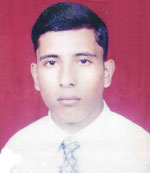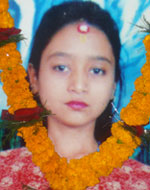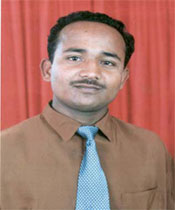Related Links
Case Updates
Krishna Adhikari
 On 6 June 2004, Krishna Prasad Adhikari, a resident of Fujel village of Gorkha District, was murdered in Chitwan District by Maoist cadres. Krishna Prasad was visiting his grandparents after having taken the SLC examinations, and he was abducted from Bakullahar Chowk by men who came on a motorcycle ...
On 6 June 2004, Krishna Prasad Adhikari, a resident of Fujel village of Gorkha District, was murdered in Chitwan District by Maoist cadres. Krishna Prasad was visiting his grandparents after having taken the SLC examinations, and he was abducted from Bakullahar Chowk by men who came on a motorcycle ... Maina Sunuwar
 Around 6 am on February 17, 2004, a group of RNA soldiers arrested Ms
Maina Sunuwar, a 15-year-old schoolgirl of Kharelthok VDC-6, Kavre
district. She disappeared since her arrest. Her family members, with
support from villagers and school where Maina was a student, visited
detention centers ...
Around 6 am on February 17, 2004, a group of RNA soldiers arrested Ms
Maina Sunuwar, a 15-year-old schoolgirl of Kharelthok VDC-6, Kavre
district. She disappeared since her arrest. Her family members, with
support from villagers and school where Maina was a student, visited
detention centers ... Sanjeev Kumar Karna
 Sanjeev Kumar Karna was one among the 11 persons arrested on October 8, 2003. On that fateful day, they had gone to attend a picnic program organized by the students at a place called Kariyachauri VDC-4, and from picnic, they went to Kataiya Chowri Area of Dhanusha district where they ate some food ...
Sanjeev Kumar Karna was one among the 11 persons arrested on October 8, 2003. On that fateful day, they had gone to attend a picnic program organized by the students at a place called Kariyachauri VDC-4, and from picnic, they went to Kataiya Chowri Area of Dhanusha district where they ate some food ... Arjun Bahadur Lama
Hari Prasad Bolakhe
Sarala Sapkota
Birendra Shah
Bishwanath Parajuli, Tom Nath Poudel and Dhan Bahadur Tamang
Chot Nath Ghimire and Shekhar Nath Ghimire
Bhauna Tharu
Family of Enforced Disappearance Observes Last Rites of Victim
Shahi was forcefully disappeared by the security forces on 6 April 2002. His whereabouts have not been made public even after 22 years.
At the height of the armed conflict, the then Royal Nepal Army had disappeared him from Sutaiya in Thakurbaba Municipality-8.
The family of the disappeared tried to establish the truth regarding Shahi's status but in vain.
Shahi's wife Jayanti Shahi, son Santosh Shahi and other family members made a grass body as per the rites and cremated the body. They are observing the mourning rites at their house in Sutaiya.
Advocacy Forum-Nepal's Lumbini Province Senior Coordinator Basanta Gautam and Conflict Victim Women National Network Treasurer Chandrakala Uprety and others went to Jayanti Shahi's house on 31 March to express solidarity with the victim's family.
Human rights defenders say that families of the disappeared have been facing familial, social, cultural and legal difficulties due to the government's apathy. They have been obliged to cremate the symbolic grass body of their loved ones to fulfil their cultural rights. Earlier, Juna Sapkota and other families of the disappeared in Bardiya carried out similar rituals.
Bardiya district recorded the highest number of enforced disappearances during the armed conflict. Both the security forces and the insurgent Maoists forcefully disappeared more than 250 people at that time.
























Join Us